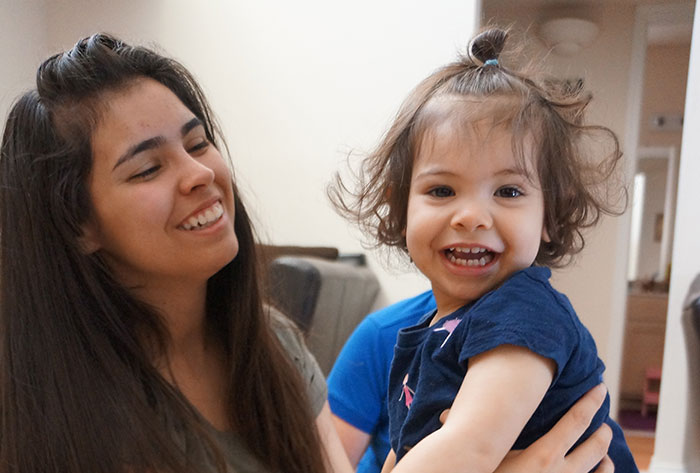All legacy email addresses will be permanently deactivated on 1/5/26.
Our email format hensforth is FirstName.LastName@commonspirit.org.

Program for new parents yields ‘promising’ results
By Dan McKay / Journal Staff Writer
Aug 23, 2022
SANTA FE – A home visiting program that educates new parents about how to promote their baby’s healthy development has shown promising early results, according to researchers at the University of New Mexico.
In a randomized study, year-old children whose parents participate in a program offered by CHI St. Joseph’s Children demonstrated better development in problem-solving, social skills and other areas, researchers said, compared to children not in the program.
But the study is still in its early stages – part of a 22-year plan to track the development and outcomes for children through high school graduation.
Paul Guerin, director of the UNM Center for Applied Research and Analysis, characterized the results so far as “promising evidence” of the program’s effectiveness.
But, it’s important, he said, to continue the study to evaluate the longer-term outcomes.
The preliminary results come as New Mexico turns increasingly to early childhood programs to help prepare children for school, and interrupt generational cycles of poverty and abuse.
Over the past decade, Republicans and Democrats alike at the Capitol have supported sharp increases in state spending on pre-K, home visiting programs and other early childhood services. General state appropriations for home visiting exploded from $2.3 million a year to $15.1 million in a recent 12-year period, according to a report by the Legislative Finance Committee.
The program under study is, however, a private one – offered by St. Joseph’s Children, a nonprofit group that is part of the Catholic Health Initiatives network and does not accept government funding.
Allen Sánchez, the group’s president, said its program is a model for other organizations. The research, he said, could also influence publicly funded home visiting programs.
St. Joseph’s Children is paying for the UNM study, which is expected to cost $5 million overall.
The early evidence “tells me we haven’t been spinning our wheels,” Sánchez said. “It means we’re doing it right.”
Guerin, whose center at UNM is leading the research, said the study uses a scientifically rigorous method – a randomized control trial – to examine the program.
The university is tracking the development of children whose families participate in the home visiting program and comparing their progress to a control group.
The control group includes children whose families were referred to the program – or sought it out on their own – but could not enroll because all available slots were filled.
Families in the control group are referred to other health and social services in the community.
The results for 1-year-olds in the program show a “moderate” effect on their problem-solving skills and smaller, but still positive, effects on their communication, social, and gross and fine motor skills, the researchers said.
In each area tested, children in the program demonstrated better skills than those not in the program.
“To date,” the researchers said in a public description of their work, “we have promising evidence of the effectiveness of the CHI SJC home visiting program in improving child development.”
The St. Joseph’s program targets parents having their first child. They are visited once a week by a professional who educates them on nutrition, activities to stimulate brain development, best practices on breastfeeding, introduction of food and other topics.
Participation can start before birth and continues until the child is three.
The program is free and available to parents regardless of income.”
These aren’t just families in trouble,” Sánchez said. “Every family can appreciate this. … Just because you have an education doesn’t mean you know how to raise a baby.”
His organization released the study’s early findings as New Mexico voters consider whether to authorize a new public funding stream for early childhood services, including home visiting. A proposed amendment to the state Constitution would boost the annual withdrawal from New Mexico’s permanent school fund – a component of the larger Land Grant Permanent Fund – to 6.25%, up from 5%. That would generate an additional $211 million a year for early childhood education and K-12 schools.
